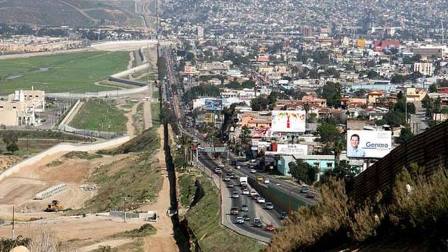“A few of my friends knew my situation and admired me for they cannot imagine how hard it is and what an effort that I have to make every day in managing to get to the school,” Yami told Xinhua in the living room of her small flat.
From Monday to Friday, the young woman has to get up as early as at 4 a.m. to dress herself up and pack her satchel, while her mother Ixtchel prepares breakfast and calls a Uber for her so as to drive her through the 1km-long El Chaparral bridge to cross the Mexico-U.S. boarder with a friend.
She keeps checking social media daily for the least crowded border in order to speed her way into San Diego.
Once across, Yami takes a bus, and then a train to school at 7 a.m..
Since her mother was deported from the United States, “the life of all the family members has changed.” Yami said on her way to school.
“The deportation separates children from their parents and siblings. This is unfair and it hurts us,” the girl groaned.
Yami, along with her sister Angela, were born and lived in Michigan until 2015 with their parents. After that, their mother took them to Mexico City which they had tried to adapt themselves to.
“It was difficult for us. We were bullied as we didn’t speak Spanish properly,” she said.
For that sake, the family decided to move back to the United States but the mother was arrested, jailed and deported to Mexico without any official papers, even with no money and few clothes.
“It will be a long time before I can enter the U.S. but I hope I could visit my daughters when they get married or have children,” Ixtchel said,
The 35-year-old mother was about to complete a postgraduate degree but now runs a small hair and make-up shop in Tijuana.
“I don’t wish this on anyone. I have to keep moving forward. Whenever I get depressed, just think about how hard my daughter (Yami) works every day to go to school and get ahead, it will keeps me going on,” said Ixtchel.
Another daughter of Ixtchel Angela is now living in the United State with her aunt.
The Mexican mother currently spends three days a week volunteering in an office to help deportees, including war veterans who were sent back to the country without documents.
Moving to the United States at the age of 12 with her parents and three brothers, the mother is struggling to fit in after being back to Mexico.
“I cannot criticize my parents. But it is very hard to live in Mexico. I have to get used to a language I lost, and also the food and customs,” said Ixtchel.
Every night, Yami returns to Mexico crossing the San Ysidro port, where her mother awaits her on the Mexican side.
“For now, being in Mexico is good for me. I am more involved with my Mexican community and culture. At the same time, being in this situation often gets to me. It is not only because I have to live in two places every day, but also because I am not with my sister,” said Yami.
The government of U.S. President Donald Trump is seeking to build a wall along the 3,200-km border separating the two countries and to deport around 3 million more migrants.
According to the National Migration Institute (INM) of Mexico, the U.S. has deported around 4 million Mexicans across the border over the past 10 years. Enditem





